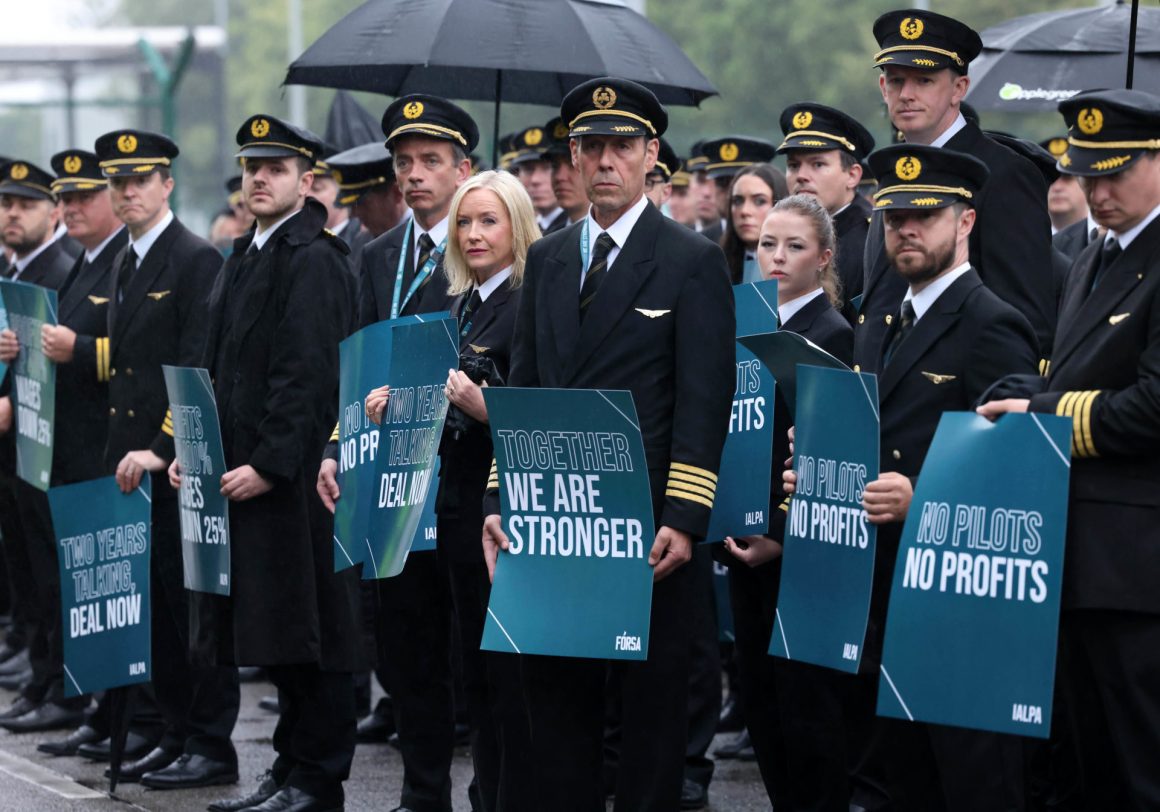By Mick Barry
The Aer Lingus pilots dispute has been the largest clash between the forces of capital and the forces of labour seen in this State in the 2020s.
Aer Lingus is a profitable company, making €225 million in 2023. It is part of the International Airlines Group, which made €3.5 billion in profits last year.
The pilots are well-paid workers, as one might expect from an extremely highly skilled, well-organised group of workers in a profitable industry.
Vilification by capitalist establishment
But people who uncritically read the corporate media might be surprised to learn that the starting rate for a co-pilot is €60,000, the average wage for a pilot is €87,000, and top rate on the salary scale is €120,000 after 22 years of service. Captains who pass several exams and have stringent proficiency checks every six months can earn up to €201,000.
Yes, there are bonuses on top of that, but none that compare to the €269,000 share bonus received by Aer Lingus CEO Lynne Embleton in late June. The executive pay increases are way out of sync too. Aer Lingus executive management awarded themselves pay hikes of 66% since 2019. Pilots have not had any increase in basic pay over those five years.
The Irish Airline Pilots Association’s (IALPA) 24% pay claim was basically a cost-of-living pay claim to cover rising prices over those years. However, the Government, big business, and the corporate media met it with sheer horror. Their fear was of “contagion” – that an inflation-busting pay hike for pilots won by industrial militancy would set a powerful example for other workers to follow.
Wages stagnate, profits rise
They knew full well that this could take a big bite out of Ireland’s big business profits bonanza. It’s possible, for example, that corporate profits rose above the €300 billion mark last year. Aer Lingus were forced to cancel 100s of flights when the pilots started their work to rule on 26 June.
The 8-hour strike on 29 June underlined the power possessed by pilots. Aer Lingus’ great rival Michael O’Leary described the action as “industrial blackmail”. Micheál Martin said that the level of passenger disruption was “shocking”. Taoiseach Simon Harris, referring to the holiday season, said it was “utterly reprehensible” to use children as “pawns”. In a reflection of its further shift to the right, Sinn Féin refused to support the action and echoed the arguments of the Government that it would have “reputational damage” to Ireland.
Despite the propaganda campaign against the pilots by establishment figureheads and the official “opposition” the action had considerable support in society. An opinion poll by Red C found that 38% supported the pilots’ demands, while 34% opposed. Another poll found that that figure broke down to 36% in favour of the pilots, while 46% opposed their demands. This support clearly reflects a desire by a significant section of workers are prepared to support industrial action to win much-needed inflation-busting pay increases.
The State intervenes
Despite Aer Lingus hiring non-union airlines to counter the pilots’ actions, it was clear that any attempt to break the pilots would be both very costly and very difficult. The State intervened in the form of the Labour Court. The Court had proposed a 9.25% pay increase in May but now put forward a package which involved 17.75% over 4 years, increases in overnight allowances and the wiping of a “debt” owed by pilots since 2019.
It is understood that the Labour Court referenced the payment of €1,700 in gift cards in 2022 as a reason for not retrospectively awarding pay for 2019-22 and that the proposed deal now starts in January 2023.
Aer Lingus decided to accept the Labour Court proposals quickly. Following some clarifications, the IALPA executive is also recommending them. IALPA Information meetings are now taking place this week, to be followed by an electronic ballot.
The media have heaped pressure on the pilots to accept the proposals with one Irish Independent journalist stating that it would be “crazy” for the pilots to vote NO to a proposal which falls more than 6% below their claim.
A lesson to be learnt
Pilots have the right to vote NO, and if the proposal is rejected, the dispute will need to be escalated significantly, with more strikes and disruption clearly on the table. But even if the Labour Court proposal is accepted, it will be a significant result for both the pilots and the Irish working class.
It will constitute a breach of the “way below the rate of inflation” pay norm and set a headline for other workers to aim at. It will also demonstrate that pay progress is possible if workers are organised and prepared to engage in actions that hit the bosses’ profits and demonstrate their power. This is an example that is of great relevance not just to other airport workers but also to working people across society.












